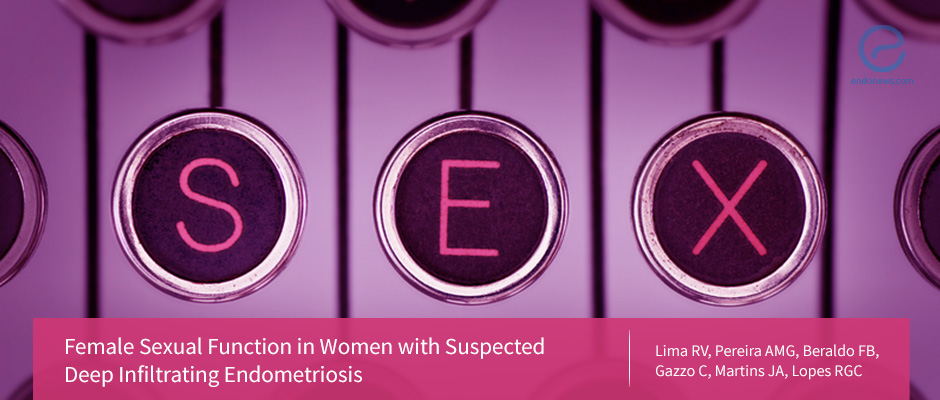Deep Infiltrating Endometriosis Impairs Sexual Function
May 25, 2018
Women with deep infiltrating endometriosis largely experienced sexual dysfunction, greatly impacting the individual's quality of life.
Key Points
Highlights:
- This study analyzed sexual function quality in women with suspected deep infiltrating endometriosis (DIE).
Importance:
- Endometriosis can impact an individual’s quality of life. It is important to discern the lifestyle areas affected by the disease because it can help tailor a more effective health care plan for women with endometriosis.
- The authors of this study argue that female sexual dysfunction may be a public health issue in females suffering from DIE.
What’s done here?
- This study recruited 67 sexually active women with suspected or diagnosed DIE. The participants were given continuous contraceptive or gonadotropin-releasing hormone (GnRH) analog.
- The researchers collected the participant:
- age, number of pregnancies, fertility, previous treatments
- surgical history pertaining to endometriosis, endometriotic lesion characteristics (by ENZIAN classification)
- urinary and intestinal problems; pain symptoms (including dysmenorrhea, dyspareunia, and non-cyclic pelvic pain, quantified by visual analog scale (VAS).
- The participants filled out the 19 question Female Function Sexual Index (FSFI) questionnaire. The higher the overall score, the better the sexual function. As a benchmark, scores lower than 26.55 would indicate sexual dysfunction.
- The data was subject to statistical analysis.
Key results:
- 92.5% of patients were symptomatic.
- Deep infiltrating lesions were typically found on the rectosigmoid colon and the retrocervical region.
- The median overall FSFI score was 23.4. 67.2% of the cases had a score less than 26.5.
- Lower FSFI scores adjusted by bladder lesion, patients’ age, and lesion size were found to correlate with Deep dyspareunia and rectosigmoid endometriosis lesions.
- FSFI pain domain, adjusted by cyclic bowel pain, vaginal lesions, and the use of GnRH analog was found to correlate with Deep dyspareunia.
Limitations of the study:
- Lack of information about the patient’s partners and relationship status.
- Other factors like comorbidities, family, religion, and personal aspects were not included.
- There was no randomization and the study utilized a small sample size.
Lay Summary
Lima et al., a group of scientists from Hospital do Servidor Público Estadual in Brazil, recently published an article entitled “Female Sexual Function in Women with Suspected Deep Infiltrating Endometriosis” in Revista Brasileira De Ginecologia E Obstetricia. The paper analyzed sexual function quality in females suffering from suspected deep infiltrating endometriosis (DIE).
The researchers recruited 67 sexually active female patients with suspected or diagnosed DIE. The researchers collected certain key pieces of information from each of the participants. The participant’s endometriotic lesion characteristics were analyzed using the ENZIAN classification. The visual analog scale (VAS) was used to analyze pain level. Each participant was given a Female Function Sexual Index (FSFI) questionnaire. This helps determine sexual function. The higher the overall score the better. A score below 26.55 indicates sexual dysfunction.
More than ninety percent of the patients in this study were symptomatic. The deep infiltrating lesions were primarily found in the rectosigmoid colon and retrocervical region. The 23.4 was the median FSFI overall score. More than sixty-five percent of participants had a score below the value denoting sexual dysfunction.
Lower FSFI scores, adjusted by bladder lesion, age, and lesion size, correlated significantly with deep dyspareunia and rectosigmoid endometriosis lesions. Additionally, FSFI pain domain, adjusted by periodic bowel pain, lesions in the vagina area and use of gonadotropin-releasing hormone (GnRH) analog, correlated significantly with deep dyspareunia.
Most women with endometriosis typically exhibit sexual dysfunction, and the deep dyspareunia was the pelvic painful symptom that showed correlation with sexual dysfunction, the authors concluded.
Research Source: https://www.ncbi.nlm.nih.gov/pubmed/29609193
sex deep infiltrating endometriosis ENZIAN Visual analog scale FSFI deep dyspareunia pain

